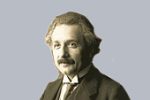German-born theoretical physicist Albert Einstein, who lived from 14 March 1879 to 18 April 1955, is regarded as one of history's greatest and most important scientists. He is best known for creating the theory of relativity, but he also made significant contributions to quantum mechanics. As a result, he played a crucial role in the dramatic transformation of science's perception of the natural world brought about by contemporary physics in the first decades of the 20th century."The world's most famous equation" is his relativity-derived formula for mass-energy equivalence, E = mc2.
His discovery of the law of the photoelectric effect, which was a crucial milestone in the development of quantum theory, earned him the 1921 Nobel Prize in Physics. His writing is also renowned for its impact on scientific thought. In a 1999 survey conducted by the British publication Physics World of 130 of the world's top physicists, Einstein came out on top. Einstein is now regarded as the definition of genius due to his uniqueness and academic accomplishments.
Einstein spent a significant amount of the final years of his academic career working on two projects that eventually failed. First, he waged a protracted rearguard battle in defense of the idea that "God does not play dice" in opposition to the underlying unpredictability that quantum theory introduced into science's view of the world. Second, he generalized his geometric theory of gravitation to encompass electromagnetic in an effort to create a unified field theory. He consequently grew more and more apart from the dominant current in modern physics.
Career
On March 14, 1879, Albert Einstein was born in Ulm, in the German Empire's Kingdom of Württemberg. His parents, Pauline Koch and Hermann Einstein, were secular Ashkenazi Jews who worked as engineers and salespeople. When the family relocated to Munich in 1880, Einstein's father and his uncle Jakob established Elektrotechnische Fabrik J. Einstein & Cie, a business that produced direct-current electrical equipment.
From the age of five, Albert went to a Catholic elementary school in Munich. He was transferred to the Luitpold-Gymnasium (now known as the Albert-Einstein-Gymnasium) when he was eight years old, where he attended advanced primary and then secondary school.

